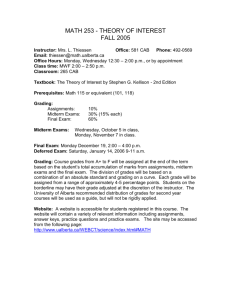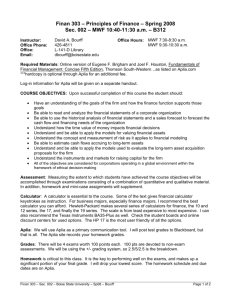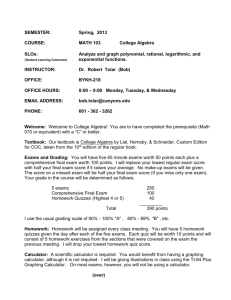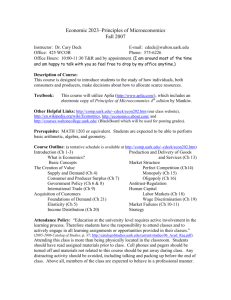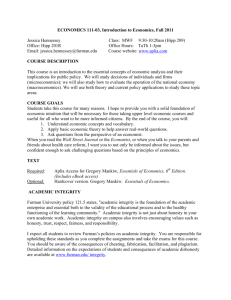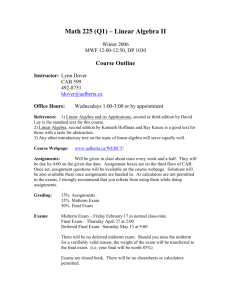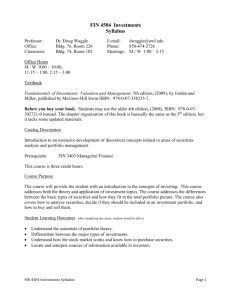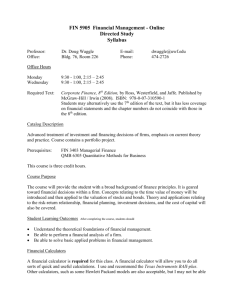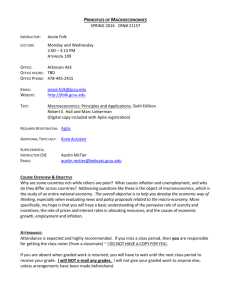Investments Syllabus - University of West Florida
advertisement
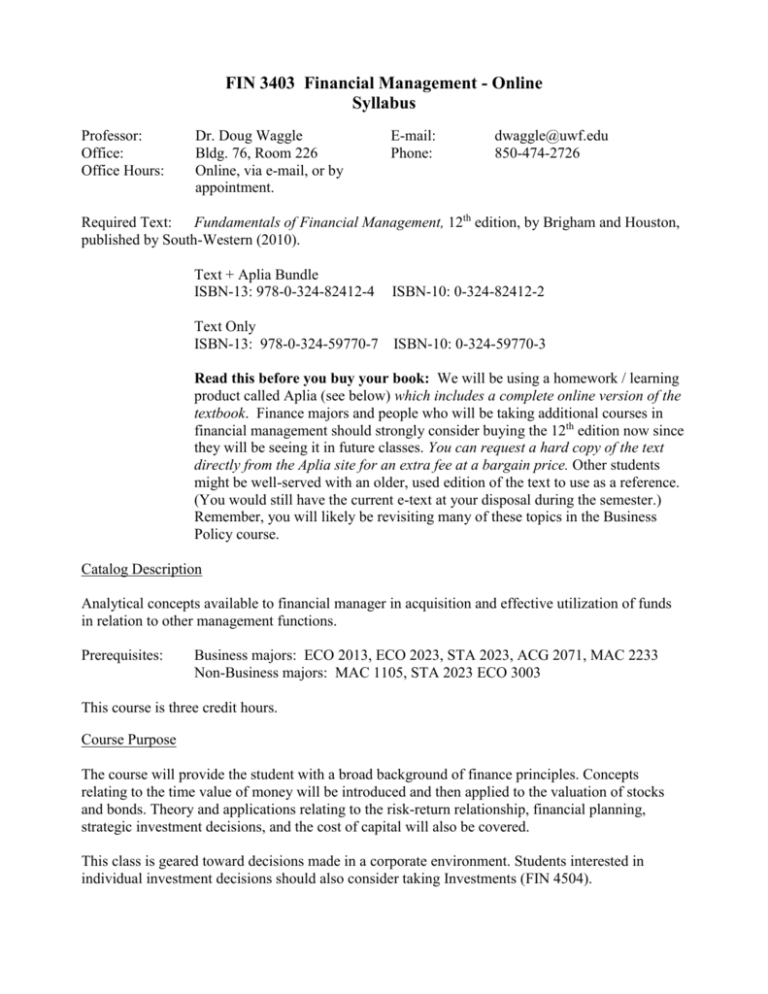
FIN 3403 Financial Management - Online Syllabus Professor: Office: Office Hours: Dr. Doug Waggle Bldg. 76, Room 226 Online, via e-mail, or by appointment. E-mail: Phone: dwaggle@uwf.edu 850-474-2726 Required Text: Fundamentals of Financial Management, 12th edition, by Brigham and Houston, published by South-Western (2010). Text + Aplia Bundle ISBN-13: 978-0-324-82412-4 ISBN-10: 0-324-82412-2 Text Only ISBN-13: 978-0-324-59770-7 ISBN-10: 0-324-59770-3 Read this before you buy your book: We will be using a homework / learning product called Aplia (see below) which includes a complete online version of the textbook. Finance majors and people who will be taking additional courses in financial management should strongly consider buying the 12th edition now since they will be seeing it in future classes. You can request a hard copy of the text directly from the Aplia site for an extra fee at a bargain price. Other students might be well-served with an older, used edition of the text to use as a reference. (You would still have the current e-text at your disposal during the semester.) Remember, you will likely be revisiting many of these topics in the Business Policy course. Catalog Description Analytical concepts available to financial manager in acquisition and effective utilization of funds in relation to other management functions. Prerequisites: Business majors: ECO 2013, ECO 2023, STA 2023, ACG 2071, MAC 2233 Non-Business majors: MAC 1105, STA 2023 ECO 3003 This course is three credit hours. Course Purpose The course will provide the student with a broad background of finance principles. Concepts relating to the time value of money will be introduced and then applied to the valuation of stocks and bonds. Theory and applications relating to the risk-return relationship, financial planning, strategic investment decisions, and the cost of capital will also be covered. This class is geared toward decisions made in a corporate environment. Students interested in individual investment decisions should also consider taking Investments (FIN 4504). Student Learning Outcomes After completing the course, students should be able to demonstrate an understanding of … The goal of financial management of the firm. Basic financial statements and financial ratios. Time value of money concepts and calculations. The valuation of stocks and bonds. The concepts of risk and return. Capital budgeting basics, including appropriate cash flow estimation. Evaluation and Grading All exams must be proctored. The midterm and final exams must either be taken in person at a UWF campus (times and locations TBA) or be proctored at a testing facility approved by the instructor. See the information on “Testing Policies” below. Students can generally choose between 2 different course evaluation alternatives, with the decision being made before the final exam. Option A: Midterm Final (Not comprehensive) Online Assignments Total Option B: 40% 40% 20% 100% Midterm Final (Comprehensive) Online Assignments Total 20% 60% 20% 100% The typical or default selection is Option A. This is for students who have successfully mastered the material on the first exam and are satisfied with their grades on that material. Students should note that even though the final exam is not specifically comprehensive with Option A, the latter material naturally builds on earlier material and those concepts must be understood and retained. Option B is available for students who would like another opportunity to demonstrate their understanding of earlier material and improve their grades. I’ll send out a request in advance of the final asking if you would like to select Option B. Option A is what you get unless you tell me otherwise. If you fall behind in the material, catching up may prove difficult. Accordingly, there are online practice sets and graded assignments that are designed to keep you on track. The assignments are open book and open note. You can seek help on these as long as you do your own work. See the section on Aplia for more details. Grades will be assigned as follows: 93-100, A; 87 – 89.99, B+; 77 – 79.99, C+; 67 – 69.99, D+; Below 60, F. 90-92.99, A-; 83-86.99, B; 73-76.99, C; 60-66.99, D; 80-82.99, B-; 70-72.99, C-; Makeup Exam Policy Makeup exams are generally not given. If a student has an unexcused absence from an exam, the general method for making this up is through taking the comprehensive final. The comprehensive final will include the weight of the missed exam and the regular final exam. Testing Policies As noted above, all exams must be proctored. Northwest Florida Students Students in the Pensacola and Fort Walton Beach areas should attend one of three announced proctored exams. If you live in NW Florida, but are unable to attend any of the exam sessions at the dates/times that are being offered, you can arrange for remote proctoring. See below for details. Students outside the Pensacola or Fort Walton Beach area Students who reside outside of this geographic area must make arrangements to have the exams proctored by an individual who is acceptable to the instructor. Most U.S. colleges and universities and military institutions can assist with proctoring. Proctors generally must have either a .edu or a military mailing address. Students should contact the testing center at their local university or community college and request such assistance. Students who will be using a non-UWF proctor must complete and submit a Proctor Approval Form (found at the course eLearning site). These forms should be submitted at least three weeks in advance of the exam being proctored. Only one form is needed for the semester. Other exam notes: Cell phones are not allowed in exams. This does not mean that you should turn your cell phone off during the exams. It means that they should not be brought to the exams at all. A financial calculator is required, and only approved financial calculators are allowed. (See the section on Financial Calculators for more information.) You may not share calculators during exams. A formula sheet will be provided to aid you on the exam. See the eLearning page for an example. Expectations for Academic Conduct As members of the University of West Florida, we commit ourselves to honesty. As we strive for excellence in performance, integrity—personal and institutional—is our most precious asset. Honesty in our academic work is vital, and we will not knowingly act in ways which erode that integrity. Accordingly, we pledge not to cheat, nor to tolerate cheating, nor to plagiarize the work of others. We pledge to share community resources in ways that are responsible and that comply with established policies of fairness. Cooperation and competition are means to high achievement and are encouraged. Indeed, cooperation is expected unless our directive is to individual performance. We will compete constructively and professionally for the purpose of stimulating high performance standards. Finally, we accept adherence to this set of expectations for academic conduct as a condition of membership in the UWF academic community. The Student Code of Conduct sets forth the rules, regulations and expected behavior of students enrolled at the University of West Florida. Violations of any rules, regulations, or behavioral expectations may result in a charge of violating the Student Code of Conduct. It is the student's responsibility to read the Student Code of Conduct and conduct themselves accordingly. You may access the current Student Code of Conduct at http://www.uwf.edu/judicialaffairs. Executive Summary of Expectations for Academic Conduct: Don’t cheat. If you do, you should expect to fail the class. Assistance The Student Disability Resource Center SDRC at the University of West Florida supports an inclusive learning environment for all students. If there are aspects of the instruction or design of this course that hinder your full participation, such as time limited exams, inaccessible web content, or the use of non-captioned videos and podcasts, please notify the instructor or the SDRC as soon as possible. You may contact the SDRC office by e-mail at sdrc@uwf.edu or by phone at (850) 4742387. Appropriate academic accommodations will be determined based on the documented needs of the individual. Financial Calculators A financial calculator is required for this class. Two models are approved: Texas Instruments BAII Plus Hewlett Packard 10BII I recommend the TI calculator, simply because it is what I have always used. I can answer questions on the use of this particular calculator. Either one should work fine, though. Modules for working with both of these calculators are included on the Aplia site. You will need to become very familiar with your calculator. You should get your calculator as soon as possible and do all of your work with this calculator. Some other calculators that might be fine otherwise have text functions which would allow for storing notes and creating an unfair situation. These alternatives are not allowed. All business majors should own and be proficient with a financial calculator. If, however, for some reason (I can’t imagine what that might be) you should decide that you would like to sell your calculator when the semester is over, here’s what you can do: 1) Post an ad on the Pensacola site for Craigslist.org that includes “UWF” and “Calculator” in the title and 2) Let me know. I’ll send out an advance notice to students signed up for the next semester’s course. Aplia Website and Homework A paid registration to the Aplia.com site is required. See the separate handout on Aplia registration on the eLearning site. Keeping up in class is very important. Homework assignments related to the current topics with regular due dates will keep you on track. While the online assignments themselves count 20% of your grade, mastering the material in the assignments should be reflected in higher grades on your major exams. The graded problem sets have firm due dates. You can change your answers as many times as you want before the due date has passed. Once the due date has passed, the grade will be recorded, and it will not be possible to change your answers or complete the assignment at this point. Aplia assignments must be completed by the due dates. No exceptions will be made. Do the assignments early to safeguard against any contingencies or technical difficulties that may arise. After the due date, you will be able to see the correct answers and the explanations for graded problems. FIN 3403 Financial Management Course Outline and Schedule Week of … August 23 August 30 September 6 Chapter 1 3 3 4 Topic Introduction to Financial Management Financial Statements, Cash Flow, and Taxes More Financial Statements Analysis of Financial Statements September 13 5 Time Value of Money September 20 5 More Time Value of Money September 27 6 Interest Rates October 4 7 Bond Valuation October 11 ** October 18 October 25 8 9 Midterm Exam (TBA – watch for dates) Chapters 1, 3-7 Risk and Rates of Return Stocks and their Valuation November 1 10 Cost of Capital November 8 11 The Basics of Capital Budgeting November 15 12 Cash Flow Estimation and Risk Analysis November 22 15 Dividends and Share Repurchases November 29 16 Working Capital Management December 6 ** Final Exam (TBA – watch for dates) Chapters 8-12, 15, 16 Note: This course outline and the dates established therein are tentative, and the instructor reserves the right to change them. This outline shows the approximate dates that material should be covered. Due dates for online assignments are all noted on the course Aplia page. Online homework is typically due by the middle of the week after inclusion on the schedule.
